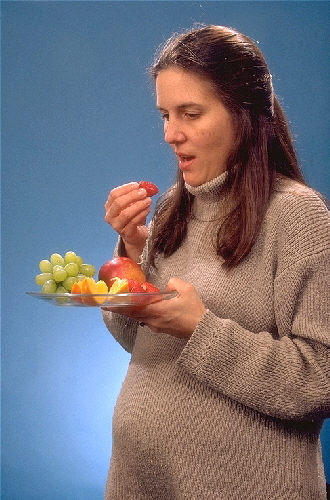- HubPages»
- Health»
- Women's Health»
- Pregnancy
A Guide to Healthy Eating During Pregnancy

Eating a balanced, nutritious diet is important for anyone’s health, but especially for an expectant mother, both for her health and for that of her baby. Misconceptions abound about proper nutrition during a pregnancy; keeping these simple points in mind will help ensure that you and your baby are as healthy as possible, during and after your pregnancy.
Many pregnant moms deal with nausea during at least the early stages of pregnancy (although for some, unfortunately, the nauseated feeling lasts for longer, or even the entire pregnancy). Obviously, this nausea can make eating regular, balanced meals a challenge. Simply do your best to work around the times of day that you feel queasy; over time, you will learn what works best for you.

How Many Calories Does a Pregnant Woman Need?
Perhaps the biggest misconception about healthy eating during a pregnancy is the old saying, “You’re eating for two now!” While that might be true in the most technical of senses, far too many people interpret it to mean that they should feel free to indulge any and every dietary craving while pregnant as much as they wish. In reality, though, nothing could be further from the truth. In fact, a pregnant mother only needs about 150 more calories per day than she did before she was pregnant in her first trimester, and 300 more calories per day in her second and third trimester. Since most women only need about 2,000 calories per day ordinarily, that is only a 7 to 15 percent increase in total caloric requirements – not the 100 percent increase so flippantly thrown around. Typically, a healthy pregnancy should translate to a temporary weight gain of between 15 and 35 pounds.
Remember, too, that 300 calories is not as much as you might think. That’s only a banana and a single cup of cereal, or a baked potato and a cup of fruit. Many women take the “eating for two” adage as gospel, especially since the stress of a pregnancy can often make them think “I deserve it” when faced with cravings for junk food. Unfortunately, that is why many expectant mothers find themselves gaining a tremendous amount of unhealthy weight as fat in addition to the normal and temporary weight gain of a pregnancy. Not only does this risk the mother’s health, it also can be harmful to the health of the baby, both in the short term and the long term. If anything, healthy eating is more important during pregnancy than at any other point in life.

What Food Groups and Nutrients Does a Pregnant Woman Need?
A balanced, nutritious diet for a pregnant woman should include such categories as complex grains, vegetables, fruits, lean protein and dairy products. The details, of course, will vary from one person to another, so you should rely on your doctor for specific advice on what nutrients you need and at what levels. The general principles below, however, are recommended by the Mayo Clinic and will give you a good starting point for designing your ideal pregnancy diet.
- A typical 110 lb., 5’4” woman (before pregnancy) needs about 4.5 cups of fruits and veggies per day in her first trimester, and about 5 cups per day in her second and third trimesters. A typical 128 lb., 5’9” woman needs about 5 cups of fruits and vegetables in her first trimester, and 5.5 cups in her second and third trimesters.
- The 110 lb. woman needs about 6 oz. of whole grains (such as brown rice, whole grain breads and pastas and the like) per day in her first trimester, and 8 oz. per day in her second and third trimesters. The 128 lb. woman needs about 7 oz. per day in her first trimester, and about 9 oz. per day in her second trimester.
- Most pregnant women, no matter what their size or trimester, need about three cups of dairy products (such as milk or yogurt) per day to ensure that they consume enough calcium and vitamin D to create the baby’s teeth and bones.
- The 110 lb. woman needs about 5.5 oz. per day of lean meat, eggs, beans and similar high-protein foods in her first trimester, and 6.5 oz. per day in her second and third trimesters. The 128 lb. woman needs 6 oz. per day in her first trimester, and 6.5 oz. in her second and third trimesters. Fish can also be a great source of lean protein, but be careful not to choose a high-mercury type of fish like swordfish, mackerel and the like; follow your doctor’s guidance for selecting the best fish for you.
- Minimize your consumption of highly processed foods that contain high levels of added sugar, sodium and fat. Try to consume most of your fat from healthy sources like nuts, avocados and the like.
- Most pregnant women should take prenatal vitamin as a precaution to ensure that they are not accidentally deficient in any important nutrients. Your doctor will be able to recommend the ideal prenatal vitamin for you.

Hydration and Pregnancy
In addition, remember the importance of staying thoroughly hydrated during your pregnancy. Not only can staying hydrated help ensure a safe, healthy labor, it can also help prevent or at least minimize a variety of common unpleasant pregnancy side effects, such as swelling, constipation, UTIs and hemorrhoids. According to the Institute of Medicine, most women need about 10 cups of water per day while they are expecting.

Conclusion
Again, remember that these are simply general principles that will apply to most pregnancies, and that the specifics will vary from one woman and one pregnancy to another. Rely on a qualified doctor’s guidance to determine how you should eat for a healthy pregnancy.
Did you/do you or your significant other take a prenatal vitamin while pregnant?
References
Mayo Clinic: “Pregnancy Nutrition: Healthy-Eating Basics”
National Health and Medical Research Council: “Healthy Eating During Your Pregnancy”
What to Expect: “The Pregnancy Diet”
BabyCentre: “Pregnancy Meal Planners: Trimester by Trimester”
WebMD: “Estimated Calorie Requirements”
Healthy Eater: “What Do 300 Calorie Meals Look Like?”
Parents Magazine: “5 Simple Ways to Eat Healthier During Pregnancy”
FitPregnancy: “The Healthy Pregnancy Eating Guide”
WebMD: “Eating Right When Pregnant”



